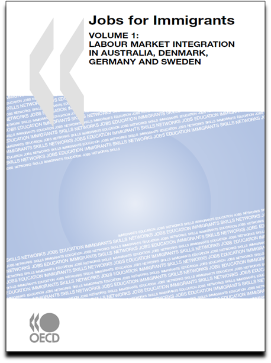Sweden
Jobs for Immigrants (Vol. 1): Labour Market Integration in Australia, Denmark, Germany and Sweden
|
ISBN: 9789264033597 Published: June 2007 Pages: 288 |
This publication reviews the labour market integration of immigrants and their children in four OECD countries: Australia, Denmark, Germany and Sweden. It is the first in a series of reports which will eventually cover some ten OECD countries. When immigrants arrive in a new country, they are confronted with new labour market requirements such as language proficiency, familiarity with job search procedures and work practices which they are not always able to satisfy. Over time, this expertise can be acquired, and in principle immigrant performance in the receiving country should be similar to that of the native-born. In practice however, differences persist: experience and qualifications may not be fully recognised, social capital may be lacking, or discriminatory hiring practices may persist among employers. These obstacles affect not only new immigrants, but, surprisingly, their children too, even if the children are born and educated in the receiving country. What can be done to improve the labour market integration of immigrants? Employers need to have the necessary information and incentives to assess the skills and qualifications of immigrants properly. Governments have a role to play in promoting language and vocational training, and encouraging diversity in the workplace. Immigrants themselves must accept the requirements of the host country employers. The viability of future migration policies, in particular greater recourse to immigration, will depend to a large extent on how successful OECD countries and immigrants are in achieving these objectives.
Country studies can be downloaded on line.
Readers can access the full text of this book.
|
A summary of the key findings is also available in German Key findings of the publication (in German)
Related Documents
